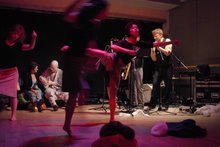Toronto was battery opera's first stop on the Canadian tour of [storm]. Performances were last Friday and Saturday at The Great Hall (Downstairs) presented in association with The Theatre Centre.
We were reviewed by Paula Citron, originally printed yesterday in The Globe and Mail. We would've linked to the article, but you'd need to subscribe to their site to get it. So here it is in its entirety:
Virile, manly men, bringing on storms
Vancouver-based battery opera is one of the most innovative dance theatre companies in Canada. The brainchild of the husband-and-wife team of composer/theatre artist David McIntosh and choreographer Lee Su-Feh, it generally follows a pattern of locking onto a simple theme, and then allowing their immense imagination to riff off into tangents that explore that theme from many different angles. En route, the audience is treated to a fascinating episodic journey that fuses dance, text and music in cunning ways.
The group’s new piece, [storm] certainly lives up to expectations. Its epicentre is the idea of how boys become men, with side trips into relationships between fathers and sons, and how shared history impacts on generations.
The philosophical implications are played out in pivotal ideas like machismo, bravado and competitiveness, not to mention cruelty and violence.
At the heart of [storm] is the metaphor of sailors and the sea, because what could be more manly than those hard-drinking, hard-living, hard-loving men who battle the waves? A corollary symbol is given over to the archetype of Ulysses and his men, particularly their encounter with the one-eyed Cyclops, which [storm] portrays as a father figure.
The all-male cast has shaved heads, reducing the body to its basic element of the flesh.
In simple costumes of shirts and pants, dancers Ron Stewart and Yannick Matthon, singer/speaker McIntosh and musician Max Murphy enact scenes of movement and dialogue that continually point to the vulnerability that lies beneath a sailor’s swagger.
Lee’s choreography is inspired by martial arts, with the men displaying stunning physicality that fills the stage.
Big, sweeping movement show the expanse of manly strength and male virility that suddenly crumbles into fetal positions or crushed bodies.
Each time the mood threatens to become maudlin or tender, McIntosh breaks into a lively sea shanty, accompanied by Murphy’s saxophone, that reintroduces the veneer of carousing sailors bent on mayhem.
Perhaps the most chilling moment is each of the four men recounting stories of supposed fathers and grandfathers who were the epitome of abuse and neglect. In each tale, women and children are the victims.
The unspoken thought is: What do these damaged men grow up to be?
Lee’s chorography would seem to indicate that they want to sever all the ties with their past but are caught in the death throes of an umbilical cord of quintessential masculinity that cannot be broken. In one brilliant sequence of intense physicality, Stewart and Matthon are tied together by arms and legs, rolling and tossing until it is almost impossible to tell which limb belongs to which man. The final moment of this episode is Stewart swaying back and forth like a Jack-in-the-box with Matthon wrapped around his feet.
Over all, the picture of man and manhood that battery opera paints is a bleak one, almost a cautionary tale that symbolizes man’s continued stumble into war and disaster. At the end, Matthon, the one man standing, adopts the jaunty air of the survivor, putting on the good face and not admitting defeat. One can only wish that he also represents hope.
Like all battery opera productions, one comes away with more questions than answers. This is compelling but disturbing dance theatre indeed.
Subscribe to:
Post Comments (Atom)


1 comment:
Wow, congratulations, you've finally received the review that storm deserves! Very good and detailed description of your piece.
Post a Comment